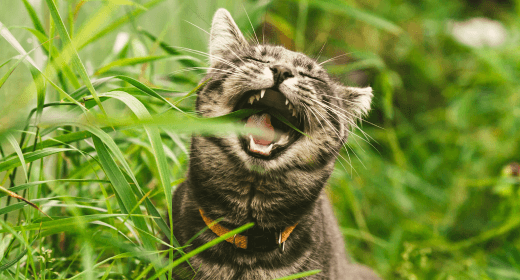Why Make a Hairball Management Formula?
- Most cats are susceptible to hairballs due to continual ingestion of hair during regular self-grooming.
- Cat owners have told us that hairballs are one of their top concerns.
- According to IAMS™ consumer research, a number of cat owners and their cats have found hairball treatments to be an unpleasant experience.
How Were the IAMS Hairball Formulas Developed?
IAMS nutritionists were looking for a way to control hairball formation while maintaining optimal feline health and well-being. They evaluated risk factors for hairball formation in cats fed diets that varied in fiber source and content.
- 98 cats were studied.
- Nine groups were fed test diets and three were fed control diets.
- The test-feeding period was six to seven weeks, following a five-week control-feeding period.
- Total cat-days of testing = 9,968.
Researchers found that feeding diets that contained a blend of beet pulp and cellulose was more effective at moving hair through the digestive tract, compared with the same diets containing beet pulp as the only fiber source.
- There was an 80% to 100% increase in fecal hair excretion with beet pulp/cellulose-blend diets, compared with the beet-pulp-only diet.
- By promoting the passage of hair ingested by the cat during normal self-grooming, an important risk factor for hairball formation is minimized.
- Hairballs were not evident in cats fed the beet pulp/cellulose-blend diets.
How Do IAMS Hairball Formulas Work?
- The fiber system (blend of beet pulp/cellulose) gently moves hair through the gastrointestinal tract while maintaining healthy digestion.
- Beet pulp, a moderately fermentable fiber, promotes optimal intestinal health.
- Cellulose helps to enhance the passage of ingested hair.
- An optimal fatty acid ratio enhances skin and coat health, which decreases the likelihood of excessive shedding, a factor related to hairball formation.
How Do IAMS Hairball Formulas Compare with Other IAMS Cat Food Formulas?
IAMS hairball formulas provide high-quality nutrition and taste, like our other adult formulas, with the added benefit of reducing the risk of hairballs.
- High-quality nutrition for adult cats
- Optimal protein and fat levels
- Higher fiber content due to added cellulose
- Excellent stool quality, skin and coat condition, and taurine status
- Great taste
- Similar acceptability and palatability test results as other IAMS adult formulas



